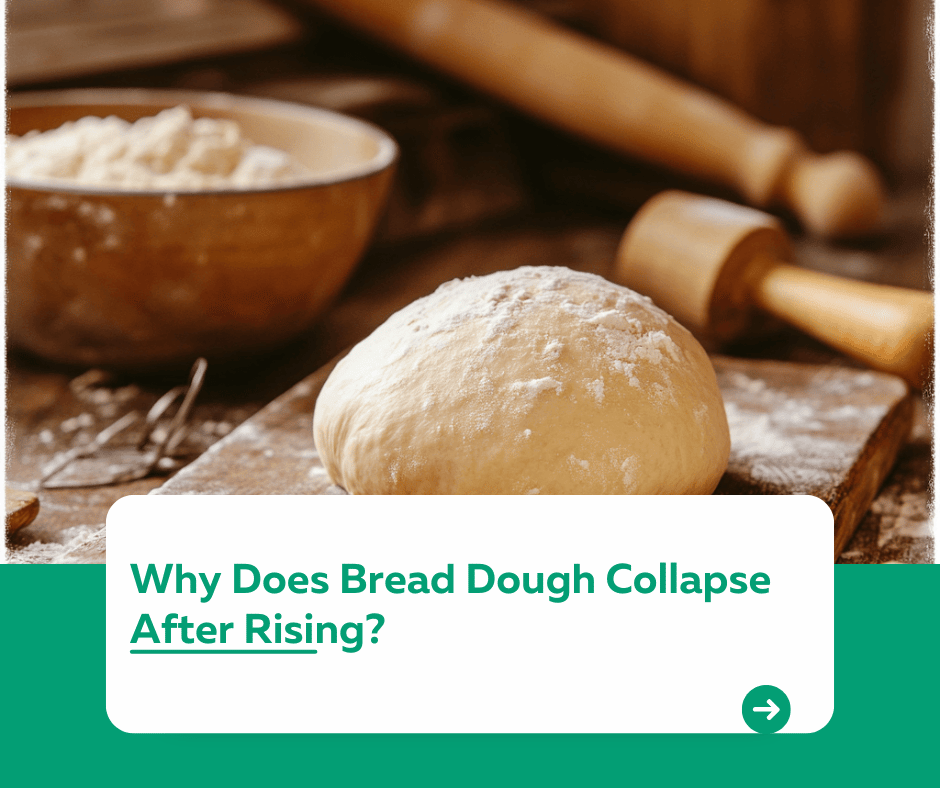
Introduction
“Why does bread dough collapse after rising?”
Few things are as frustrating for a baker as dough that rises beautifully only to collapse before or during baking. This common problem can happen for various reasons, including over-proofing, weak gluten structure, or improper handling. Understanding the causes and solutions can help you achieve perfectly risen bread every time.
1. Over-Proofing the Dough
Over-proofing is one of the most common reasons for dough collapse.
- Why It Happens: Dough that is left to rise for too long weakens as the yeast exhausts its food supply, causing it to deflate.
- Signs of Over-Proofing:
- Dough feels sticky or overly soft.
- It doesn’t spring back when gently poked.
Solution:
- Stick to the recommended proofing time.
- Use the poke test: Press a finger into the dough—if the indent springs back slowly, it’s ready to bake.
2. Weak Gluten Structure
Gluten provides the framework that holds the dough together.
- Why It Happens: Insufficient kneading or using low-protein flour results in weak gluten, unable to hold the gas bubbles created by fermentation.
- Signs of Weak Gluten: Dough tears easily or doesn’t stretch well.
Solution:
- Knead the dough thoroughly until it passes the windowpane test (stretching it without breaking).
- Use bread flour for recipes requiring strong gluten.
3. Improper Shaping
Shaping affects how well the dough holds its structure.
- Why It Happens: Large air pockets can form if the dough isn’t shaped properly, causing it to collapse.
- Solution:
- Gently degas the dough during shaping.
- Create a tight, uniform surface to support the rise.
4. Temperature Issues
Temperature plays a crucial role in dough rising and baking.
- Why It Happens:
- Proofing in overly warm environments causes rapid fermentation, leading to collapse.
- Baking in a cool oven prevents the crust from forming in time to support the structure.
Solution:
- Proof at an ideal temperature (75°F–85°F or 24°C–29°C).
- Preheat the oven thoroughly before baking.
5. Excess Moisture in the Dough
High hydration doughs are more prone to collapsing.
- Why It Happens: Excess water weakens the gluten structure, making it harder for the dough to hold its shape.
- Solution:
- Stick to the recipe’s hydration levels.
- Use flour sparingly during kneading to maintain the right consistency.
6. Insufficient Fermentation
Under-fermented dough lacks the gas production needed for a stable rise.
- Why It Happens: The yeast hasn’t had enough time to ferment and produce gas.
- Solution:
- Allow the dough to proof fully, following the recipe’s guidelines.
- Look for visual cues, like dough doubling in size.
Conclusion
Bread dough collapse often results from over-proofing, weak gluten structure, improper shaping, or temperature issues. By paying close attention to proofing times, kneading techniques, and environmental conditions, you can prevent this frustrating problem and enjoy perfectly risen bread every time.
For more baking tips and troubleshooting advice, visit our Kuestion.com.